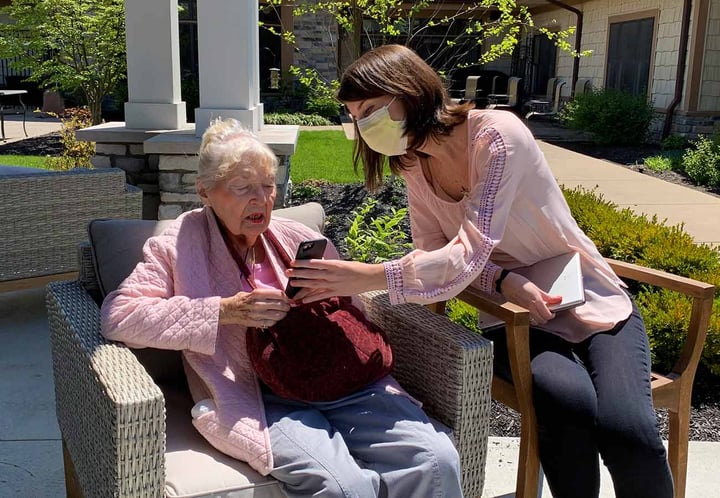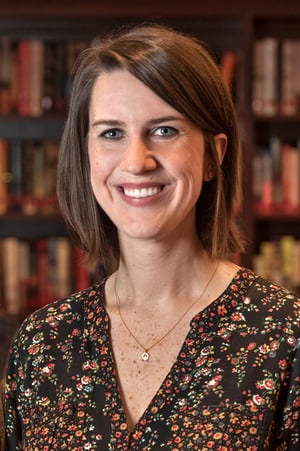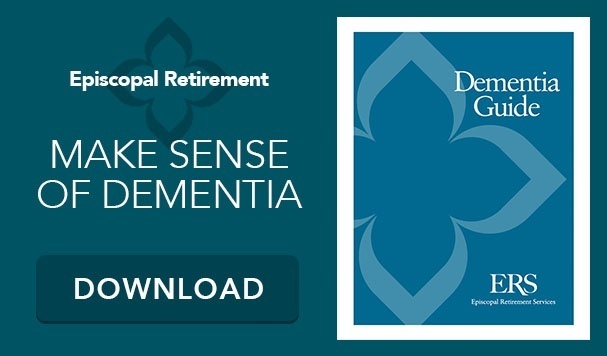
Since 1951, Episcopal Retirement Services (ERS) has focused on providing a safe and welcoming environment for our residents, visitors, and team members. Our newest step along this journey is the new Center for Memory Support and Inclusion.
The Center is part of a three-year, fully-funded pilot program designed to support seniors living with dementia across not only ERS’ retirement communities, but also the greater Cincinnati area. It combines the resources of ERS, UC Health, the Alzheimer’s Association of Greater Cincinnati, and other healthcare and aging service providers to improve memory care on a community-wide scale.
Shannon Braun joined ERS in 2020 and leads The Center for Memory Support and Inclusion as its Director. We recently sat down with Shannon to learn more about the Center, memory care, and caregiving during the COVID-19 pandemic.
Q: Now that caregivers are likely spending more time with their older loved ones due to the pandemic, how can you tell if someone needs a dementia screening? What are the warning signs?
SHANNON: For starters, it’s important to note that there are many different types of dementia, most of which are progressive, and some are reversible. For example, severe depression or delirium can mimic dementia symptoms.
It’s crucial to narrow down the underlying cause of your loved one’s cognitive changes, especially now with COVID-19. So, you have to ask yourself, “Are these changes because my loved one is out of their normal routine? Are they not getting enough water or not getting outside enough? Is the decrease in social interaction affecting them?” There are many reasons why someone could decline in memory or give the perception that they're declining in memory because of what's going on right now.
There are ten warning signs that someone is developing dementia, including decreased judgment, personality changes, and memory loss. If you notice symptoms in your loved one, they should be assessed by a doctor — whether that's a geriatrician, neurologist, or neuropsychologist. There are many avenues in which to obtain an assessment.
The need for an assessment also brings up another important question: when do you know that it's time to have someone come into the home and help you care for your loved one? Similarly, how do you know when it’s time to place your loved one in a memory care community? I think a lot of that depends on the person who is the care partner.
Sometimes it's easier for non-family members to offer support with activities like bathing. People with dementia are often more agreeable to certain types of daily living assistance if it comes from a professional. I think that’s sometimes surprising for people to hear or understand.
Also, when you're an at-home caregiver, you are the cook, the cleaner, the activity director, the personal care attendant — all of these different roles. And ultimately, it really can take a toll. If you allow yourself to be the care manager and help coordinate your loved one’s professional senior care, it can benefit all parties.
Memory loss and dementia are a long, slow progression, so you should regularly reevaluate your situation — otherwise, you might miss the warning signs.
Q: As caregivers, the need to pivot and reevaluate during the COVID-19 pandemic has become even more critical. Our staff members have experienced that, as well as family caregivers. Do you have any tips?
SHANNON: I think it's always hard to ask for help. Period. Especially for care partners and family caregivers.
The pandemic impacts all of us, but for some, the impact is catastrophic. The peeling away of support that caregivers relied on before is unimaginable. And people who would have chosen to make a nursing home placement or an assisted living memory care placement are deciding between, “OK, I can move forward with that choice because my loved one desperately needs it. But that would mean I am saying goodbye, and I don't know when I'll see them again.” 
So, I think reaching out is vital. You are holding on to your support community — whatever that looks like for you. Support groups have been instrumental for so many people now. Most of them don't happen in person anymore, which is such a loss. But if you can challenge yourself to get comfortable with the virtual aspect of online support groups, there's still a benefit there.
Also, have a list in your mind of things that would be helpful so that if someone asks, “How can I be supportive?” you have concrete answers for them. Often, people help in ways that are easy for them or ways they believe to be helpful.
I had a client once whose neighbor knew she was caring for her husband. Her neighbor came over and said, “I'm going to help you. I'm going to do all of your yard work. You don't have to worry about your gardening.”
The client was so appreciative of her neighbor’s offer, but gardening was the one thing that brought her peace and calm. That was her self-care. So, she almost gave up stress relief. And so, what does she do? Does she turn down the help? Does she have the courage to say, “Actually, that wouldn't help. But if you could make me a meal, that would be great.”?
Have things in your head on the off chance that someone will ask how they can help. Also, let them help. People are looking for ways to feel connected and to feel purposeful right now, so it allows them to do that.
Q: Let's talk a bit about one of the support systems that has been peeled during the COVID-19 crisis. Many people in the Cincinnati area felt supported by the memory cafes you were instrumental in starting in the public libraries. Five or six were operating when COVID-19 shut everything down. Has the program been able to continue in a virtual or outdoor setting?
SHANNON: The Harrison branch is continuing by offering virtual memory cafes. Michelle Elliott is the branch manager at the Harrison Library, and she's been so excellent and so dedicated. She understands the importance of the memory cafes and social connection. What we’ve been doing, which has been unique, is turning to storytelling. We'll have a topic like a vacation, and the attendees will email her pictures beforehand. Then, during the virtual meeting, Michelle will pull up Bob and Sally’s snapshot in Alaska on a train ride. And then, both Bob and Sally will be on the Zoom call and together will share the story. It's good for them because there's a visual, and it's a shared story. So, the person with dementia isn't put on the spot for coming up with details. And even if, let's say, the spouse is the one telling the story the whole time, it can still be a reminiscent and engaging process.
Q: Can you explain the “Improv” technique of “Yes, and…” how it is used to enable caregivers to deal with challenging behaviors and situations?
SHANNON: “Yes, and…” is an attitude. If you approach any situation with a "Yes, and…" attitude, what you're doing is you are agreeing with the situation and adding to it.
Dementia is difficult because it challenges our perception of reality. If someone with dementia is having a conversation with me and telling me things that just aren't true or they're sharing a memory that we both were a part of, and their version of it just didn't happen that way, my initial instinct is to correct them. It's natural for us to want to tell the truth and to set the record straight.
When we provide someone with the simple “Yes, and…” strategy, it frames the situation for them. So, now I have a goal to work toward. My initial instinct isn't to correct but to go in. It reshapes how I'm viewing the entire interaction. Now, it doesn't matter whose version of the story is accurate. It becomes a way that I can interact with this person. We can have meaningful engagement. And it's something that people do all the time anyway. “
As a social worker, I'm always an advocate first.
- Shannon Braun
“Yes, and…” is a framework for making it OK to go along with their reality.
Some people have a hard time with that. Some people say, “I can't lie to my dad. I would never lie to my dad.” Other people say, “oh, that sounds fun!” Wherever you land on that spectrum of comfort, the improv strategy allows people the opportunity to enter their loved one’s reality. Plus, the more you do it, the more comfortable you get and the easier it becomes.
Q: What part of your role do you find the most rewarding or that you enjoy the most?
SHANNON: Since family members are not allowed into the communities right now, it's a real honor to be with the residents. It's emotional. It's draining. It feels unfair, but that's where we are.
The pandemic has dramatically shifted my role and the way it was intended to be. While I’m eager to roll up my sleeves and dive into the community-wide dementia education and advocacy work as planned, I’m appreciative of my time working directly with residents and families at Deupree Cottages.
Q: Speaking of, you and the Deupree Cottages team saw the need to start an informal “coffee talk” for those family members who can’t be together. So, all of the attendees are in the same boat. In your experience, have these moments helped families?
SHANNON: Of course. We can either be alone by ourselves, or we can be alone together. And that the conversation allows families to express how lonely they feel and how this time impacts them. And even just expressing and sharing these feelings and recognizing that you're not the only person who feels that way makes such a difference. It's such a unique position to be unable to see or touch your loved one. None of us could ever have anticipated this. And, yet, here we are, and everyone's doing the best they can under these circumstances.
As a social worker, I'm always an advocate first. I think the conversations give the families an avenue to come together and advocate for their parents. And sometimes it is emotional. Sometimes the frustration comes out. A lot of times, their gratitude comes out. It's a way to express themselves and realize that they’re in it together. We all are.
Please feel free to contact us with any specific questions. We're here to help!












